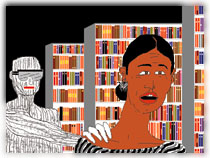Main Menu · Search ·Current Issue ·Contact ·Archives ·Centennial ·Letters to the Editor ·FAQs
 Illustration by Eyal Rimmon
Illustration by Eyal Rimmon |
Murder at Harvard occurs with fair frequency in fiction. Here's how the latest whodunit begins, in A Darker Shade of Crimson, by Pamela Thomas-Graham '85, M.B.A.-J.D. '89 (Simon & Schuster, $22).
Laugh at their jokes. Shout when necessary. Maintain a certain distance. Dress impeccably. Know who's who. Save your money. Look them in the eye. Count to ten. Straighten your hair. Pray for strength. Plot your revenge. Have a best friend. Call home often. Keep it real. Call them out. Work the phone. Remember where you came from. And be very, very good.
Being young and black at Harvard requires advanced survival skills. Seven generations of us have found it exhilarating, perplexing, difficult, and dangerous. For Rosezella Maynette Fisher, it was murder.
The day she died was the first day of the fall semester, and word spread quickly through the campus, eclipsing stories of summer jobs, August love affairs, and the biannual ritual of course selection. The unexpected death of a Harvard dean, especially an outspoken black woman who had bulldozed her way up from being a level-3 part-time secretary, was worth a few moments' pause in even the most harried undergraduate's life.
Ensconced in my second-story office in the economics department in Littauer Center, I looked down on the lush green of the Yard and the small clusters of students making their way among its narrow paths, musing about how the semester would go on inexorably, with or without her. There would be a perfunctory ceremony at Memorial Church, at which the sages of the University would offer a few kind, well-scripted words for the next morning's edition of the Crimson. Then the whole episode would be forgotten by most people.
But not by me.
You see, I was the last person to see her alive.
My name is Veronica Chase, Nikki to my friends. An assistant professor, I have the dubious distinction of being the only black member of Harvard's economics department. At 30, I often feel the mantle lies heavily on my shoulders. For a time, Rosezella Fisher made it lie heavier still.
Author Thomas-Graham means this book to be the first in a series that will take sleuth Nikki Chase to all the Ivy League institutions and is at work on a mystery set at Yale. One supposes the fictional young economist will move from place to place, book by book, until tenured and will thereafter find mayhem on sabbatical at Penn or during a visiting professorship at Cornell. One hopes she will not persist all that time in tedious fencing with resistible/irresistible lover Dante Rosario, rising star in the government department.
This first offering is competently crafted, fast paced, and sufficiently plausible. Don't look for sly satire, despite the opportunities the setting affords; Thomas-Graham takes alma mater, its inhabitants, and all proceedings most seriously. For Harvard mystery fans, local color may be the draw. The author flubs a few details of the scene, for which prosecutorial readers who like to seize on such things will be grateful. She thinks that the main entrance to the Yard is the "Johnson" Gate, for instance. She thinks that Memorial Hall is made of red stone. She thinks (or writes, anyway) that the University has "trustees." Egregiously, she has an innocent notion of what constitutes serious money at Harvard. Her heroine sits on the Crimson Future Committee, which is charged with projecting the University's fundraising requirements. On page 159, Chase and a full-professor committee member from the Business School, busy crunching numbers, find to their alarm that the University will need to raise money--at least as much as $75 million, or in the worst-case scenario $130 million--over the next five years. Whew, says Chase, "I don't envy Barrett [the president] having to tell the alums that."